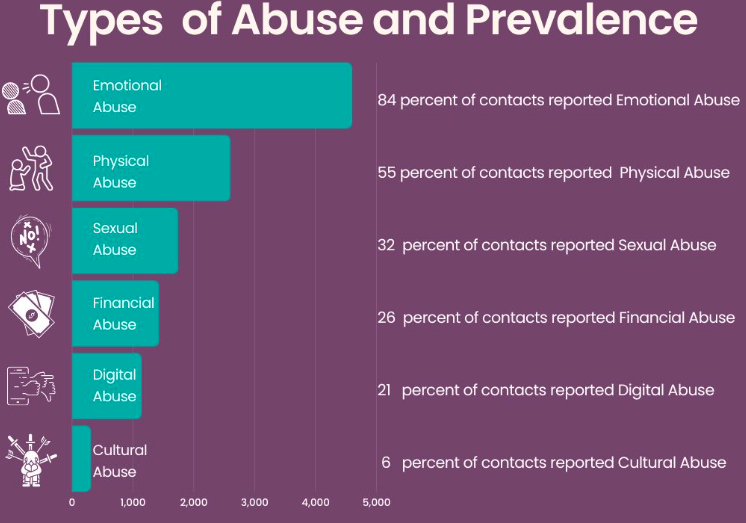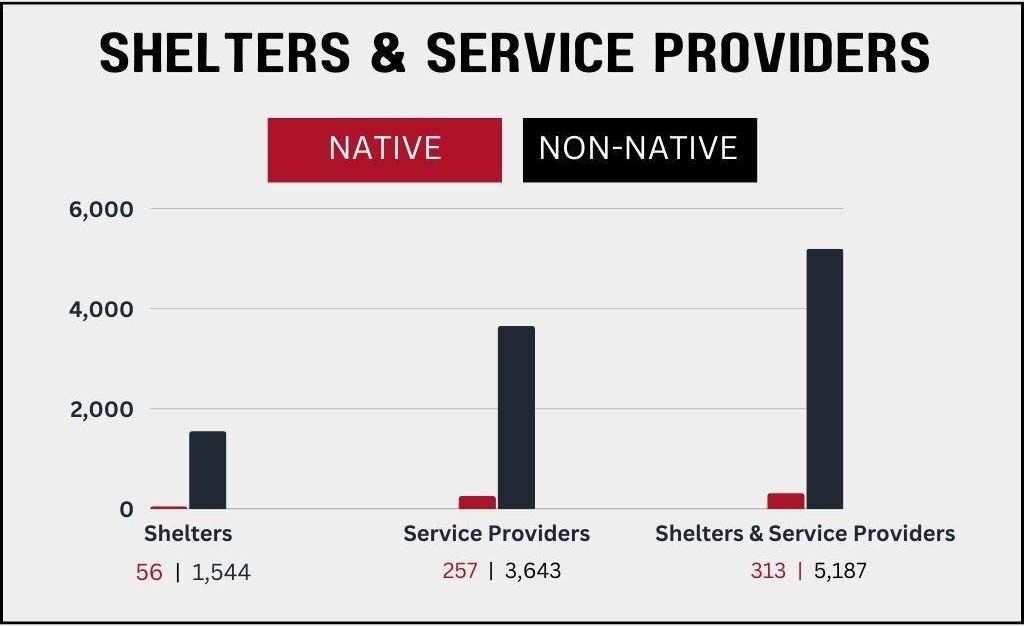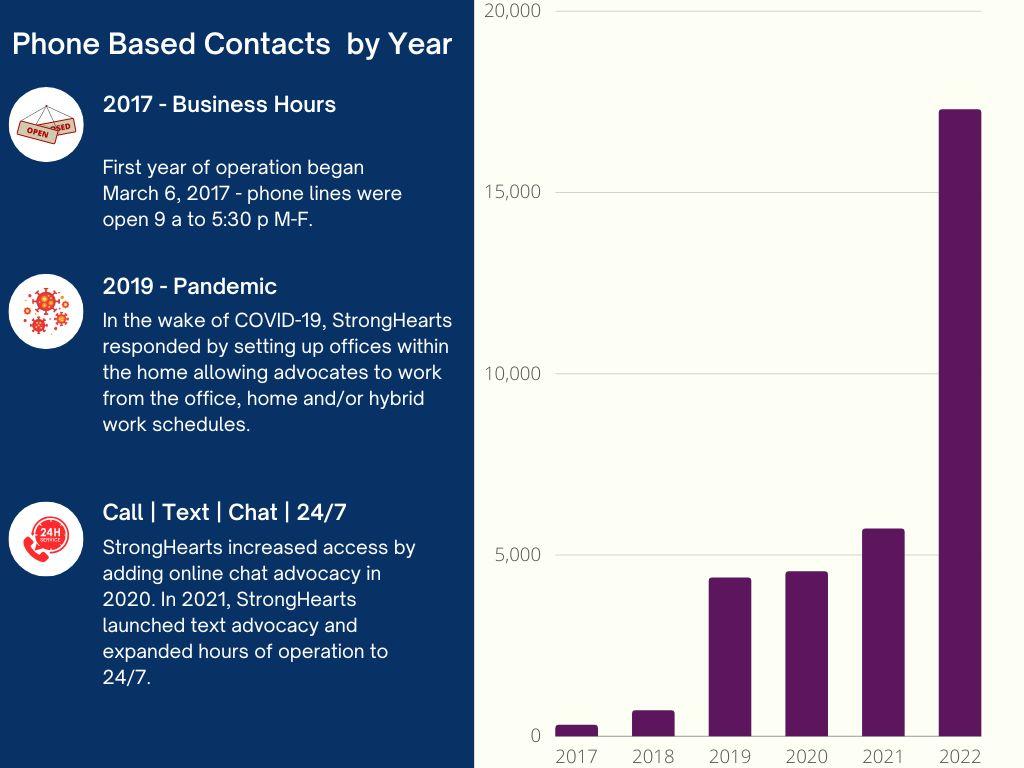- Details
- By StrongHearts
Transitioning To Remote Work Opens New Doors
It’s been more than six years since StrongHearts Native Helpline opened its phone lines to offer victim advocacy and support for American Indians and Alaska Natives (AI/AN). To say they’ve come a long way is an understatement—especially in the wake of a pandemic.
“We came out of a pandemic true to form as resilient Native people,” said Lori Jump, (Sault Ste. Marie Chippewa/ Anishinaabe) CEO, StrongHearts Native Helpline.
“Not only did we survive as an organization, we thrived while facing adversity. Our commitment didn’t waiver, and our determination to succeed was undeniable.”
Jump refers to established benchmarks to expand hours of operation from 9 a.m.-5:30 p.m. to 24/7, to increase access by adding text and online chat advocacy, and to enhance advocate training by adding components to address sexual violence and human trafficking.
Missing and Murdered Indigenous Relatives
“The additional training components speak to the crisis of our Missing and Murdered Indigenous Relatives (MMIR) and how they intersect with domestic and sexual violence,” Jump explained. “We collaborated with the Department of Homeland Security (DHS) Blue Campaign to develop culturally sensitive training to support victims of human trafficking.”
Unfortunately, people in most need of food and shelter are often preyed upon by predators who target the poorest communities in the country. They know where they find people desperate for work and take advantage of them under false pretenses by offering job opportunities or even love, support, and companionship.
Increased Staff and Advocates
As StrongHearts became more widely known, staff and advocates anticipated growth in the number of contacts:
- In the first nine months, StrongHearts started with two advocates who answered a few hundred calls.
- The following year, the number of calls more than doubled.
- In 2019, StrongHearts increased its advertising and marketing efforts to spread awareness that help was available, resulting in several thousand more contacts.
- In 2020 and 2021, when the pandemic necessitated spatial distancing, StrongHearts responded by offering remote advocate positions. Again, contacts grew by several thousand.
- In 2022, contacts exceeded the “all-time” number in the previous five years with advocates answering more than 40,000 contacts.
- Over six years, StrongHearts has hired 39 front-line advocates and 11 administrators and support staff.
Adaptation To Remote Work
Due to the COVID-19 pandemic, StrongHearts had to improvise and adapt to social distancing by utilizing and offering remote work to advocates and staff. Though this was never intended to be a permanent remedy, StrongHearts discovered that by providing at-home positions, more Native people could apply in different states nationwide.
“StrongHearts was created for Native Americans by Native Americans,” said Jump.
“By transitioning to remote work, we opened new doors for Native people to apply for jobs with StrongHearts. Headquartered in Minneapolis, MN, with a branch office in Sault Ste. Marie, MI, we now employ advocates in 15 different states.”
Michigan Office
Welcomed by the State of Michigan, StrongHearts opened the Michigan office in Sault Ste. Marie. The State reached out to StrongHearts, wanting to support eradicating violence against Native Americans by providing after-hour services to Michigan Tribes.
Jump explained, “We know that abuse doesn’t happen between 8 a.m. to 5 p.m. The opportunity for victim-survivors to call their respective Tribes and to connect with a StrongHearts advocate after hours can be lifesaving.”
Michigan’s pilot program allowed participating Tribes to “opt-in” and offer support and advocacy by tapping into StrongHearts phone lines after regular business hours. Tribal members could have direct access to a StrongHearts advocate and receive peer support, emotional support, crisis intervention, and safety planning, as well as referring them to Native-centered service providers and resources.
“Advocates help by listening and supporting survivors through some very dark hours when navigating intimate partner violence,” Jump explained. “This added layer of protection helps to bridge the gap between victim-survivors and Tribal member service providers and resources.”
Real-Time Data

In just six years, StrongHearts data has identified victim survivor demographics, types and prevalence of abuse, barriers to justice, and discovered crisis-level disparities. Thus far, data suggests there is an incredibly high risk for domestic violence and sexual violence in all age groups and across the lifespan:
- Ages range from 13-73+ years. However, most contacts are between the ages of 20-39 years.
- Emotional, physical, and sexual abuse are more often reported than financial or digital abuse.
- The top five barriers to service include access to services, mental health services, other reasons, finances, and transportation.
- Crisis level disparities. For Native American survivors, there are 56 shelters and 257 Native-centered service providers. For non-Natives, there are 1,544 shelters and 3,643 service providers.
When Native people suffer some of the highest rates of violence among 574 federally recognized Tribal nations, it is appalling that there are only 313 culturally appropriate shelters and service providers. The disparities in services are catastrophic.
National Statistics

A study conducted by the National Institute of Justice (NIJ) in 2010 and published in 2016 concluded:
- 97% of Native women and 90% of Native men experience violence at the hands of interracial (non-Native) perpetrators.
- 35% of Native women and 33% of Native men experience violence by intraracial (Native) perpetrators.
- More than 4 in 5 Native Americans have experienced violence in their lifetime.
- 83% of AI/AN women have experienced violence in their lifetime.
- 56% of women have experienced sexual violence.
- 28% of men have experienced sexual violence.
- In some counties, rates of homicide are 10x more than the national average.
- Homicide is the leading cause of death for Native women, with more than 3 in 4 being killed by intimate partners.
“Indigenous people have been plagued by five centuries of historical trauma that has accumulated throughout American History. As a culturally appropriate helpline for Native Americans by Native Americans, StrongHearts advocates understand the significance of being Native-centered, trauma-informed, and empowerment-based,” concluded Jump. “In our seventh year of operation, we are just beginning to address the need for cultural healing. We seek to eradicate violence, restore safety, and preserve sovereignty for all Tribal nations, but on a personal level. Every step we take toward healing is a step we take to ensure the safety and sovereignty of our children.”
StrongHearts advocates are available 24/7 to provide support and advocacy, make referrals to Native centered service providers and connect our relatives to regionally available resources. Call or text 1-844-762-8483 or chat online at strongheartshelpline.org
Source
André B. Rosay, "Violence Against American Indian and Alaska Native Women and Men," June 1, 2016, nij.ojp.gov
Help us defend tribal sovereignty.
At Native News Online, our mission is rooted in telling the stories that strengthen sovereignty and uplift Indigenous voices — not just at year’s end, but every single day.
Because of your generosity last year, we were able to keep our reporters on the ground in tribal communities, at national gatherings and in the halls of Congress — covering the issues that matter most to Indian Country: sovereignty, culture, education, health and economic opportunity.
That support sustained us through a tough year in 2025. Now, as we look to the year ahead, we need your help right now to ensure warrior journalism remains strong — reporting that defends tribal sovereignty, amplifies Native truth, and holds power accountable.
 The stakes couldn't be higher. Your support keeps Native voices heard, Native stories told and Native sovereignty defended.
The stakes couldn't be higher. Your support keeps Native voices heard, Native stories told and Native sovereignty defended.
Stand with Warrior Journalism today.
Levi Rickert (Potawatomi), Editor & Publisher

